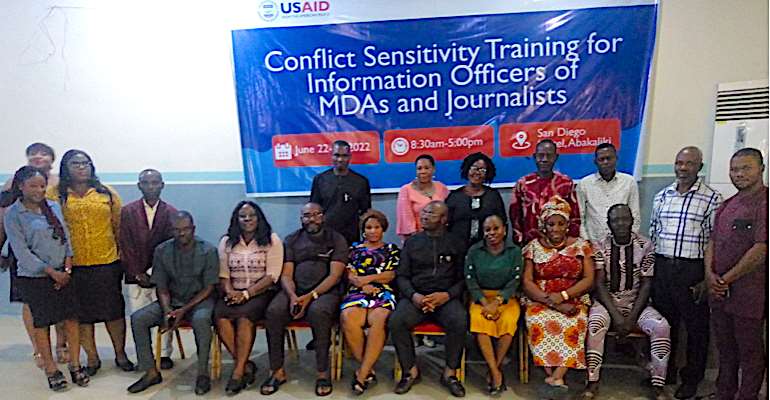Conflicts: Report to Mitigate Risk of Violence, USAID-S2S Charges Journalists.

Journalists in Ebonyi State have been charged to beware of the content and language of their reports so as not to promote ethnic or group sentiments capable of heightening already existing tensions in Nigeria.
The admonition was an outcome of a 3-day Conflict Sensitivity Training for journalists, Information Officers of Ministries, Departments and Agencies in Ebonyi State.
The event held in Abakaliki, Ebonyi State capital from June 22 to 24, was organised by the United States Agency for International Development - funded State Accountability, Transparency and Effectiveness (State2State) Activity.
The lead facilitator at the training, and the Communication and Knowledge Management Specialist, State2State Activity, Obinna Chukwuezie, in a presentation, noted that three-quarter of Nigeria's geopolitical zone were already in conflict situations.
He charged journalists and other information handlers to always report in such a way that the conflict does not degenerate into violence, even as preparation for 2023 general election was in top gear.
Chukwuezie maintained that due to the complexity of today's society with differing values and interests; where good ideas could birth bad results and unintended consequences, journalists should beware of their content and the language with which those contents are dished out.
According to him, all journalists and information managers have the responsibility to exercise caution, and report in a way to mitigate risk of violence triggered by insensitive messages which impact on human security and social cohesion.
Chukwuezie explained: " Conflict sensitive journalism is being conscious of contents and expressions that are capable of inflaming ethnic, religious and political passion and generate negative reactions, and working deliberately to avoid them.
""All Reporters and Information Officers must analyse and fully understand all possible effects of their planned stories."
Acknowledging that communication was key to ending conflicts, the specialist further cautioned journalists against dehumanizing people and violating their dignity for any reason.
"Sometimes, it is not what is being said, but how it is said: Conflict is 10 percent what we say, and 90 percent how we say it.
" When you respect and honour people's dignity, you prevent conflict.
"To do no harm, tell your story in a way to avoid negative, but maximize positive impacts.
" When Public Officers goof, their spokespersons should quickly mitigate negative outrage with responsible, sensitive and sensible response to the people" Chukwuezie emphasized.
Other resource persons, including the Local Government Area Manager on S2S, Mrs Victoria Ebere Eze and the Gender and Social Inclusion specialist, Ejiro Okotie, took participants on topics relating to gender balancing and objectivity in reporting.
Eze explained that the objective of the training was principally to equip journalists with the capacity to use their report in building bridges of peace, promote solutions and development rather than escalating conflicts.
She joined the lead facilitator to call on participants to always verify their facts from appropriate authorities before reporting so as not to generate undue tensions and Conflicts capable of threatening the peace of society.
In a goodwill message, the State Commissioner for Information and Orientation, Barr. Uchenna Orji, described the Workshop as apt, considering the security situation in the country.
Orji, represented by Information Officer from the Ministry, Lucy Anyim, expressed optimism that the outcome of the training would help advance peace in the State, and country in general.
Appreciating USAID-S2S for the initiative, he pledged the readiness of the State to continue to partner with USAID in ensuring that its lofty objectives were achieved.
In a remark, the Chairman, Nigeria Union of Journalists, Ebonyi State Council, Tony Nwizi, also a participant in the training, urged his colleagues to take the training seriously.
He urged USAID-S2S, to sustain the tempo of its capacity building programs, which he observed has been positively impacting.
Nwizi added: "Ever since my assumption of office, we have always advocated developmental journalism."
